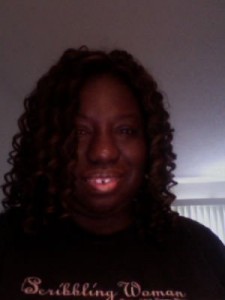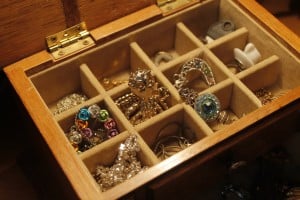Name: Clio Ajana
Age: 46
Living: Writer and Educator
Location: Twin Cities, MN
A bit about myself…
My life in the Twin Cities includes writing, teaching, translating, dancing, collecting comic books and enjoying craftwork. I consider everything in my life to be touched by my religious practice and spiritual beliefs.
What is Hellenic Orthodox/Hellenic Alexandrian?
The religion is Hellenic Orthodox; the spiritual tradition within the religion of Hellenic Orthodox that I practice is Hellenic Alexandrian (as in Alexandria, Egypt). We are definitely traditional, not eclectic, but we are not British Traditional. My group is a lodge of an international religious body (our structure is similar to a Masonic system, with a central organization and lots of decentralized lodges, temples and houses). We worship the Gods of Egypt, Greece, and Rome. Our belief system is pantheistic (divinity is indwelling in all created matter- rocks, trees, animals, etc.) and polytheistic (many deities, both masculine and feminine). We recognize three creational currents- male/male, male/female, and female/female. All such couplings create on some plane of existence, if not all on the plane of matter in which we all live. We acknowledge that all created matter is both masculine and feminine, no matter which gender a body is.
Our statement of Ethics, which promotes self-accountability and self-reliance, is known as the Witches’ Law. Our view of cosmology, including the three creational currents, is in the Universal Doctrine. Both of these statements describe what we believe and how we fit into the universe. http://www.ourladyofcelestialfire.org/law-of-the-divine.pg
What drew you to the Hellenic Alexandrian path?
Short answer: Lady Hecate.
Longer answer: I was able to have a full connection with the Gods, with pure divinity in the Hellenic Orthodox religion. I was able to come out as a woman, a lesbian and a witch on this path. I did not have to hide who I was from anyone and I could worship as I pleased. Being in a GLBT- friendly group was very important to me.
How long have your been on this path?
I came to explore Paganism in 2004 and began to learn about the Hellenic Orthodox religion in 2005. I initiated in 2006.
How did you get into it?
I met my current group in 2004 at the Twin Cities Pagan Pride in Minnesota. I attended open worship rituals, including full moons, dark moons and sabbats for over a year before committing to the group. I was attracted by the people, the laughter and the acceptance of the Gods in everyday life. The style was closer to what I personally preferred in terms of structure. I liked knowing that everyone got together for all rituals and that might be several times a month or more. I thrived on that level of structure.
Can you describe some of your practices, both daily and seasonal, like which gods do you worship (if any), meditation, rituals, prayers, anything.
I do daily prayer, keep a journal, attend ritual practices on full moon, dark moons and sabbats (we have 9). I have a full range of Gods I worship. A few would include Hecate, Ma’at, Thoth and Apollo.
Seasonally,our year runs from Saturnalia (December) through Pomonalia (October) with six weeks of rest at the end of the year before the next Saturnalia sabbat. During this six week period, I consider new projects and ideas I wish to put into place starting in December at the Saturnalia ritual.
My favorite Sabbats are Pomonalia, the remembrance of the dead and Brunalia (February), when the spark of creativity is renewed with the increasing light and the fires of Hestia and Hephaestus. I live in a colder climate, so this reminder that the light is returning is very important to me.
One aspect of my pre-Pagan life which has carried over into my current religious practice is the frequency and use of prayer. When I have a problem, I speak with the Gods in prayer or
I go into circle (private ritual) to perform spells or simply to listen to what the Gods have to say. I find it very grounding.
Our tradition has a grounding and centering practice which I find comforting to do on a daily basis or more often during the day, as needed.
I do meditate, but it comes and goes. I combine it with yoga more than anything religious.
What has been your experience of it spiritually (the most challenging, the most fulfilling, etc)?
The most fulfilling aspect of this religion is the deep connection with the Gods. I am home.
The most challenging aspect of practicing Hellenic Orthodox is the anonymity. I am a traditional witch who holds Wiccan degrees, however I am not worshipping Celtic deities. I spend a lot of time explaining what I do both within the Pagan community and without.
What was your upbringing like in terms of religion?
I was raised traditional Fundamentalist/Baptist (think Holy & Sanctifed/apostolic groups of Southern Virginia)on my father’s side and AME (African Methodist Episcopalian) on my mother’s side. Church services were at least once a week. Summer visits to Virginia included services 2-3 times on Sunday.I attended Baptist nursery school, Catholic primary and secondary school, and a Methodist undergraduate college located in the heart of Jerry Falwell country. I began to question Christianity at age 9, since I did not agree with the trinitarian principle. I began my practice of astrology and numerology as a teenager. In college, I left Christianity for Judaism.
After two years of positive interaction, I converted to Judaism and remained there for the next 18 years. Eight years after my conversion, I had a crisis of faith due to a series of deaths. Despite my active synagogue involvement, I was spiritually unfulfilled. In part, what I wanted was restricted by notions of gender and roles for women in traditional Judaism. I wanted to know that I was good enough as I was. I moved to Minnesota in 2004 and began to explore Paganism. After two years, I initiated into a polytheistic-pantheistic religion, the Hellenic Orthodox Religion which has origins in the forms of Hellenic- Numen-Kemetic systems.
Do your friends and family, coworkers know about your spiritual path? If not, why not?
Yes. Most of my friends are Pagan or Pagan-friendly. My family knows about my spiritual path. Those co-workers familiar with my writing know about my spiritual path, but I don’t announce it just in passing.
Since I work in education, my religion and sexual orientation are not pertinent in my working life. As a writer, my work details my religious beliefs, so anyone who has attended my readings knows about my life and my faith.
Do you have a spiritual community? If not, would you like one?
Yes, I do have one and I am truly grateful for it. While I could do this path as a solitary, I am grateful that there are others who share the joy and love of this path. Some things are hard to discuss with those who are not witches or Pagan.
How has the path changed you? How much of you stayed the same?
I often say that the ‘real’ Clio came out when I embraced my true self as a witch. I came out as a lesbian, fully supported and encouraged by my Pagan friends and my circle. That would not have happened before. My prior religious background did not support my goals to become clergy without certain restrictions. This is not the case now. I am more appreciative of myself and my own path. My confidence as a woman and more importantly, as a spiritual being has soared since I began this path.
What has stayed the same?
My sense of humor, an appreciation of my history and a need for a structured and disciplined religion has stayed the same. My desire was for structure without patriarchal restrictions, and I found it here.
What recommendations would you have for someone who wants to explore this path? Resources, advice, etc.
- Find a Pagan Pride festival and go. Talk with people. Listen to what they say about themselves and their traditions. Pick up pamphlets. Read them. Note which ones appeal to you. If someone invites you to a festival or a ritual gathering, consider it. Take a friend if you don’t want to go alone.
- Attend all the rituals you can at the Pagan Pride festival. a) They are public and usually fairly short. b) You get an idea of what might appeal to you.
- Look at a Pagan newsgroup list (online or at any festival /gathering where there is a calendar of events). Go to something local. It doesn’t matter whether it’s a Tarot Q&A, a coffee chat, or an info session on staving, the idea is to meet new people who are pagan.
- Connections and people matter more on this path than books or what you can find on the internet. If you are far away and the internet is your only option, that is another matter. In that case, I would say find trusted online groups and at least 10-12 people to “interview” via email or Skype before committing to any one path.
- Take your time. I spent two years finding the right group for me, because I wanted group worship, rather than solitary worship. I wanted the discipline,the camaraderie, and a similar value structure.
- Resources: Witchvox http://www.witchvox.com/, Pagan Pride http://www.paganpride.org/, Patheos http://www.patheos.com/Religion-Portals/Pagan.html; Daughters of Eve (for Pagan Women of Color) http://www.patheos.com/blogs/daughtersofeve/;
- This path is all about the experience. LIsten to your heart. Allow the Gods to come in.
- Don’t be afraid to ask and speak with others. As a black Pagan, new to the community, I found that some folks were very open about who and what they were. This helped me to navigate to where I wanted to be. I try to return the favor whenever I see a woman or male of color at a festival or a gathering.
Were there a community of black pagans that helped you along your path? In the beginning? Currently?
No. In fact, I saw only four black pagans during my first three years: one left the community, two were solitaries and one was in my tradition, although we didn’t meet until much later. Currently, I have more knowledge of black pagans through a few online groups and my friendships with other black pagans whom I’ve met in the past five years. I find the emergence of black pagan blogs and online groups to be a welcome addition. The sad reality is that these resources are still hard to find for someone who is just starting out.
What advice would you give to new black pagans/Wiccans upon the path?
1. Listen. Then go home to consider what has been said.
2. Go to Pagan Pride and other Pagan festivals as much as possible. If you see another black pagan, speak to him or her. Listen some more.
3. Remember to be open to the Gods and accountable for all you say to others.
4. Pick your battles wisely.
5. There is racism within the Pagan community. It’s an unfortunate reality. Some of it is a silent surprise that someone black would even consider a Pagan tradition or religion. Be aware of it and keep your eyes on the prize: your faith.
6. Focus on yourself. If you are “new” – figure out who you are, why you are here and what you need to gain to help yourself. Do not involve yourself (and it is incredibly easy to do) in pagan politics, drama and bullshit. Your own path will lead you home.
7. Listen some more – to your heart, to what the Gods say to you and most of all to what you are learning about yourself.
Name one misconception of being a black witch, pagan, Wiccan that you personally feel should be addressed? How should the black pagan community combat it?
The misconception that I feel should be addressed is two-fold: first, the presumption that blackness or black skin means that the individual is Christian; second, the presumption that black pagans only practice African traditions. In terms of the ‘box’ labeled “Perception of Black Pagans”, if you don’t fit, there doesn’t seem to be much out there.
I can see why many of the black pagans I’ve met online or in person have chosen to be solitary:
The black pagan community can combat it by being hyper-visibly present,regardless of one’s tradition, especially for those who worship non-African traditions. Not every person is going to worship the same deities or have the desire to do so. Why should this be a given if one is white, but not if one is black?
The more others can see that there are plenty of black and brown faces showing up worshiping at public circles and festivals, the more layers of bias will begin to unravel and peel away from the perceptions of the larger Pagan community and the world at large.
Are you a pagan and/or Wiccan of color? African traditionalist, regardless of ethnicity? Email [email protected] if you’d like to be featured in DOE Q&A.
















